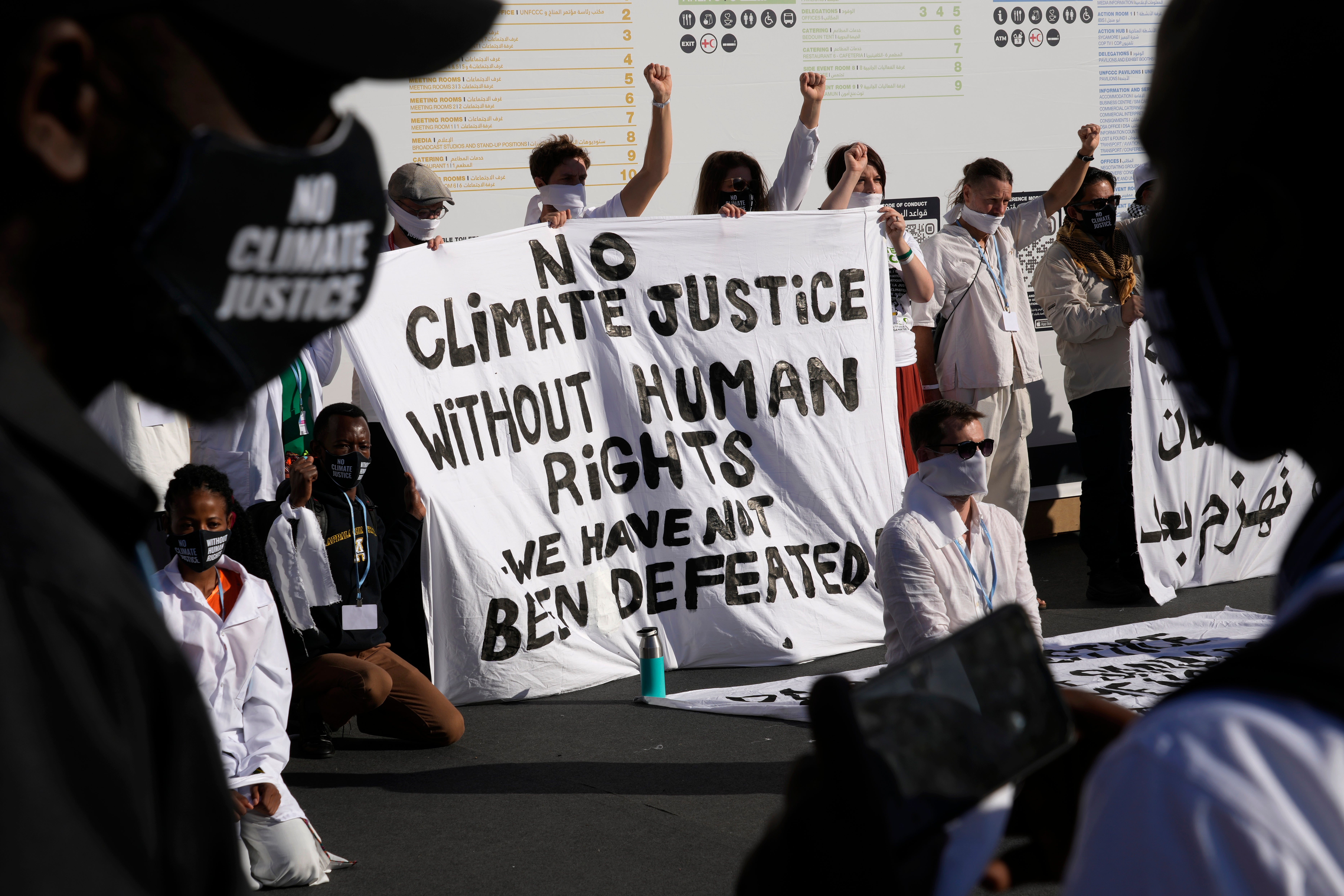Martin Luther King’s famous quote needs amending in 2022
A wholesale reframe of how we fight for human rights is required. It is an illusion that there are separate departments of injustice, writes Bel Trew


Perhaps the biggest takeaway from Cop27 may not have been the breakthrough agreements hammered out at the end, or the pledges to finance vulnerable countries hit hard by climate disasters. Aside from these achievements, it was the first time where human rights and climate rights were really spoken about on a global stage as being inextricably intertwined.
We can no longer pretend that they are separate. Or, in fact, that any sort of justice can be discussed in a vacuum. It is part of a growing movement towards forming a truly integrated approach to the neverending struggle for true human rights. As in one of Martin Luther King’s most over-quoted sayings, uttered nearly six decades ago: “Injustice anywhere is a threat to justice everywhere. We are caught in an inescapable network of mutuality.”
This should not just be applicable to groups of people, but to types of injustice, too. You cannot claim to be working on, say, children’s rights in countries where general freedoms of expression are curtailed, you cannot claim to be working on climate rights in states where activists are in prison and being tortured. Everything is so deeply integrated. And so we should amend the quote: “Injustice in any form anywhere is a threat to justice in any form everywhere.”
At the heart of this paradigm shift this year I think was the story of Alaa Abd el-Fattah, a British-Egyptian father, software developer and writer who is unlawfully detained in Egypt. He recently turned 41 in jail – in fact, he has spent most of the last decade behind bars for his human rights work.
Right now, he is serving his latest five-year sentence on charges of spreading false news after he shared a Facebook post criticising conditions in Egyptian prisons. Despite repeatedly petitioning the Egyptian authorities, the British government has been unable to even secure him a consular visit, which is his right. At the time of Cop27 – as world leaders including UK prime minister Rishi Sunak descended on Egypt’s coastal city of Sharm el-Sheikh – he was on a hunger and water strike. He was so weak he collapsed, nearly died and had to be revived.
His story – likely to the annoyance of the Egyptians – dominated the discourse at Cop27. It was the exclamation mark to the key point made by activists that we cannot have climate justice without human rights. You cannot raise awareness about the climate crisis in a place where protests are banned and rights activists are locked up (and dozens of people were arrested in the run-up to the climate summit). Any statement about fighting for climate rights in that context sounded tinny and hypocritical.
From the other direction, human rights are directly impacted by climate change. Desertification, food shortages, rising sea levels and soaring temperatures are going to not only create fresh humanitarian crises but aggravate existing inequalities and human rights abuses committed against the world’s most vulnerable groups.
This week, researchers at the University of Birmingham released a new study showing that climate uncertainty is creating health threats for thousands of people in refugee camps, and is so severe it is impacting humanitarian organisations’ ability to provide them with sanctuary: the basic right of any refugee.
This is increasingly urgent, as the study said 65 per cent of refugee camps worldwide are located in “climate hotspots”. And adding to the problem is a surging number of environmental refugees – those displaced by the impact of sudden change to their environment.
To keep up to speed with all the latest opinions and comment, sign up to our free weekly Voices Dispatches newsletter by clicking here
“By 2050, there could be more than 200 million environmental refugees globally due to the impacts of climate change such as sea-level rise, water security issues, and increased drought/flooding and extreme weather events,” said Tahmina Yasmin, a postdoctoral research fellow at the University of Birmingham. The report called for “long-term provisions” for climate refugees – who of course have the right to a healthy environment and a safe shelter.
Human rights and climate justice are inextricably intertwined. It also goes beyond this pairing, this headline of Cop27. If in Egypt, protests are banned (and so the right to freedom of assembly and association) then any attempt by the authorities to say it is working on, for example, women’s empowerment, is just performative. If Alaa is behind bars, then any promises to deliver on climate justice are hollow.
This applies to the entire globe. In an increasingly connected world, we need a wholesale reframe of how we fight for human rights – it is an illusion that there are separated departments of injustice. We need an integrated, holistic approach for all.






Join our commenting forum
Join thought-provoking conversations, follow other Independent readers and see their replies
Comments